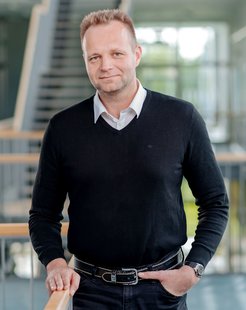EU Promotes Transfer of Research Results from the Laboratory to Industrial Biotechnology
ERC Proof-of-Concept Grant for the Max Planck Institute Magdeburg
Dr. Steffen Klamt, 50, head of the research group “Analysis and Redesign of Biological Networks” at the Max Planck Institute for Dynamics of Complex Technical Systems Magdeburg, is receiving 150,000 euros from the European Research Council (ERC). In collaboration with two industrial partners, this grant will be used to translate a newly developed metabolic engineering strategy for microorganisms into biotechnological application.
Microorganisms can synthesize a wide range of chemicals from renewable resources and will continue to gain importance in a sustainable industry. Often, however, the cells do not produce the desired substances on their own or not efficiently enough and must therefore be converted into high-efficiency producers by suitable interventions in the metabolism.
In a previous project, which was also funded by an ERC grant from the EU with 2 million euros, Steffen Klamt's group has established a strategy for optimizing microbial production organisms over the past five years. This approach involves the targeted manipulation of the cellular energy metabolism, which forces the cells to synthesize even more of the desired product. Laboratory experiments have shown that this strategy can lead to remarkable increases in productivity for different microorganisms and target products.
From Basic Research to Industrial Application
The next logical step - with the financial support of the ERC Proof-of-Concept Grant - is to test the new technology in realistic biotechnological processes with two industrial partners. These include the young Hamburg-based startup COLIPI. The company is developing bioprocesses with yeasts for the production of various lipids and oils based on renewable raw materials, thus offering sustainable alternatives to vegetable oils such as palm oil for the cosmetics and food industries. The second partner is the globally active chemical company BASF SE. The planned project will focus specifically on bioprocesses for the synthesis of aroma ingredients. In both collaborations, the metabolic intervention strategy developed by the Klamt group will be carried out in the respective production organisms and tested with regard to its potential for productivity increases. If the new concept proves successful, it could become the basis for optimizing other biotechnological production processes.
About Steffen Klamt and his Research Group at MPI Magdeburg

Steffen Klamt, born in Magdeburg in 1972, studied applied systems science at the University of Osnabrück from 1992 to 1998. In 1998, he began his research work as a research associate in the Systems Biology Group at the Max Planck Institute Magdeburg under the leadership of the founding director Prof. Dr.-Ing. Ernst Dieter Gilles. In 2005, he received his doctorate from the University of Stuttgart on the computer-aided analysis of metabolic networks. Since January 2009 Steffen Klamt is head of the research group "Analysis and Redesign of Biological Networks" at the Max Planck Institute in Magdeburg.
The group conducts research at the interface of biology, mathematics and engineering sciences in the fields of systems biology, synthetic biology and systems biotechnology. The researchers develop mathematical approaches, algorithms and corresponding software and combine them with experimental investigations in order to obtain a systemic understanding of metabolic and regulatory processes in microorganisms and to be able to influence them in a targeted manner, for example for biotechnological applications.
More about the ERC Proof-of-Concept Grants
The European Research Council (ERC) is an institution established by the European Commission to fund excellent basic research in the EU. The research projects funded have a high-risk/high-gain profile and enable groundbreaking innovations. Following on from this, the ERC has created a further funding scheme in the form of "ERC Proof-of-Concept Grants". Scientists who have already been funded by an ERC project receive additional financial support of EUR 150,000 for a funding period of 18 months to transfer the economic potential and social impact of their research results into application. Further information can be found here: https://erc.europa.eu/apply-grant/proof-concept
